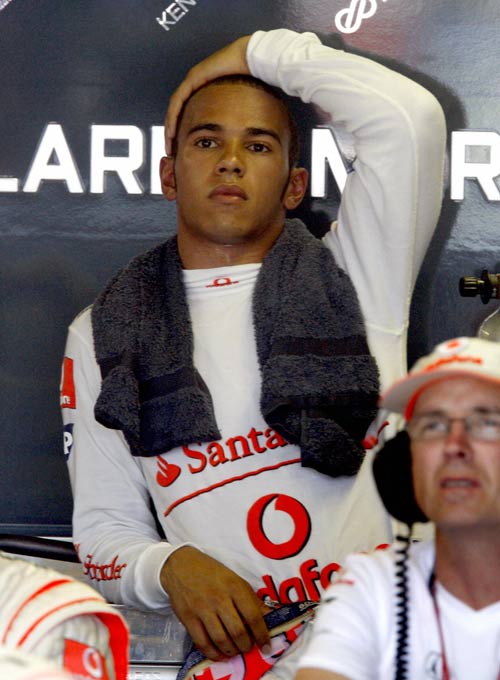Hamilton opposes standardised engines

Formula One world champion Lewis Hamilton is against FIA president Max Mosley's idea of using a standardised engine for all F1 cars.
Mosley has called for the introduction of a low-cost Cosworth engine from the 2010 season as part of cost-cutting measures being discussed with the teams. The FIA World Motor Sport Council will be voting on the proposals Friday in Monte Carlo, Monaco.
"I don't think that's going to happen. Formula One is a manufactured sport and you won't have Formula One without the manufacturers," Hamilton said today. "What are you going to do? I can't imagine it (Formula One) ever being without Ferrari, without Mercedes Benz, without Renault.
"All these big companies are what make the sport, therefore there is a constructors' championship as well as a drivers' championship."
Meanwhile Williams CEO Adam Parr has dismissed suggestions the team could be the next to hit the financial wall in Formula One.
Honda's demise last Friday sparked widespread fears the sport would be thrown into chaos on the back of the global credit crisis.
Earlier this week Parr himself stated another manufacturer would pull out before the start of the new season at the end of March.
Many sceptics thought it would be Williams pulling out, especially after announcing a £21.4m loss for 2007.
However, Parr said: "Many of our partners have stood by us and been incredibly loyal.
"In the past couple of months we have either renewed, extended or upgraded many of our existing contracts with them.
"Because they are all so loyal and fantastic we will get through this, and we have a very decent budget for next year.
"We are looking forward to having a very competitive car and we are very much full on back at the factory with development.
"So for those thinking we will pull out of Formula One, my message to them is 'See you in Melbourne'."
Clarifying his remarks about another team quitting F1, Parr added: "It was a stupid thing to say, not because I necessarily think it's wrong, but because it wasn't constructive.
"People often look at a team like Williams and ask 'How can we survive?' and they've been asking that for a very long time.
"But the difference between Williams and many of the other teams in F1 is that many of the others are funded by one shareholder, and they are in F1 primarily for marketing.
"That shareholder can decide at any time the cost benefit does not add up, and that is what happened to Honda.
"But a team like Williams cannot decide to drop out of F1 because that is all we do, so it's quite straightforward.
"When I made that comment I meant, 'Is there a risk another major shareholder will decide not to be in Formula One?' and there is a risk and the sport has to be ready and prepared for that.
"I don't think it is a catastrophe for the sport and there are many things we can do to compensate, like putting three cars on the grid.
"But if it (another withdrawal) were to happen, then it could be an independent team or a manufacturer. There is no emphasis either way."
Parr, meanwhile, believes Max Mosley's Kinetic Energy Recovery System (KERS) has become "an impossible project."
The debate over KERS is currently raging in Formula One, especially over costs.
Ferrari president Luca di Montezemolo, who is also president of the Formula One Teams' Association, has described its introduction as a mistake.
It is almost certain Ferrari will not run KERS for 2009, with di Montezemolo's concerns this week supported by Norbert Haug, the boss of McLaren's engine partners Mercedes-Benz.
The system stores energy under braking and releases it back into the car, offering a short burst of extra horsepower per lap.
Mosley sees F1's use of KERS as a forerunner to what will appear in the not too distant future on road cars.
But nearly all the teams are facing an uphill task to introduce it next year.
Williams are amongst them, and Parr added: "KERS is a very, very difficult project, and it would be fair to say a lot of the teams are struggling with it.
"Whether, and when, KERS can be implemented remains to be seen. I wouldn't hang my hat on it.
"In theory the 80 horsepower could make a huge difference for seven seconds down a straight, and whilst we relish the challenge of KERS, it's an impossible project, ridiculous.
"You have to get a motor the size of a torch that stores a massive amount of energy, but be so light that you can still carry ballast on the car and balance it properly."
However, Parr concedes the Williams engineers are relishing arguably one of the most difficult tasks they have been presented with.
"It's an absolutely fantastic challenge and to do it on a sensible budget, which we have to do, makes it even more exciting," added Parr.
"It's worth having a go because we are pushing the boundaries of energy storage which is the most fundamental problem on this planet.
"But we know we are doing things that are beyond the realms of what anyone has thought of.
"I think that's really exciting and worthwhile, and if it makes the car go faster, then it might make its way onto the car."
(PA)
Join our commenting forum
Join thought-provoking conversations, follow other Independent readers and see their replies
Comments
Bookmark popover
Removed from bookmarks